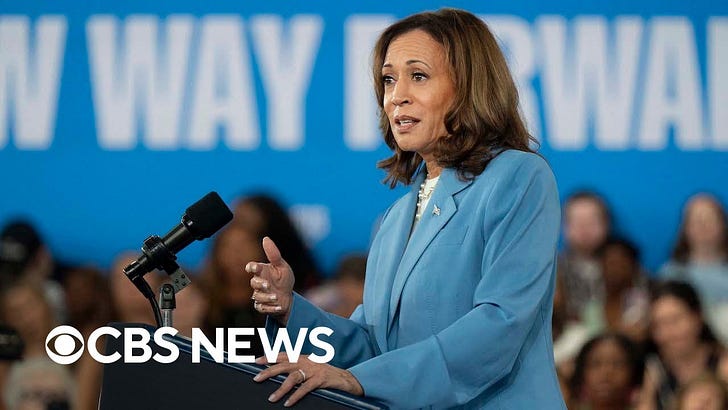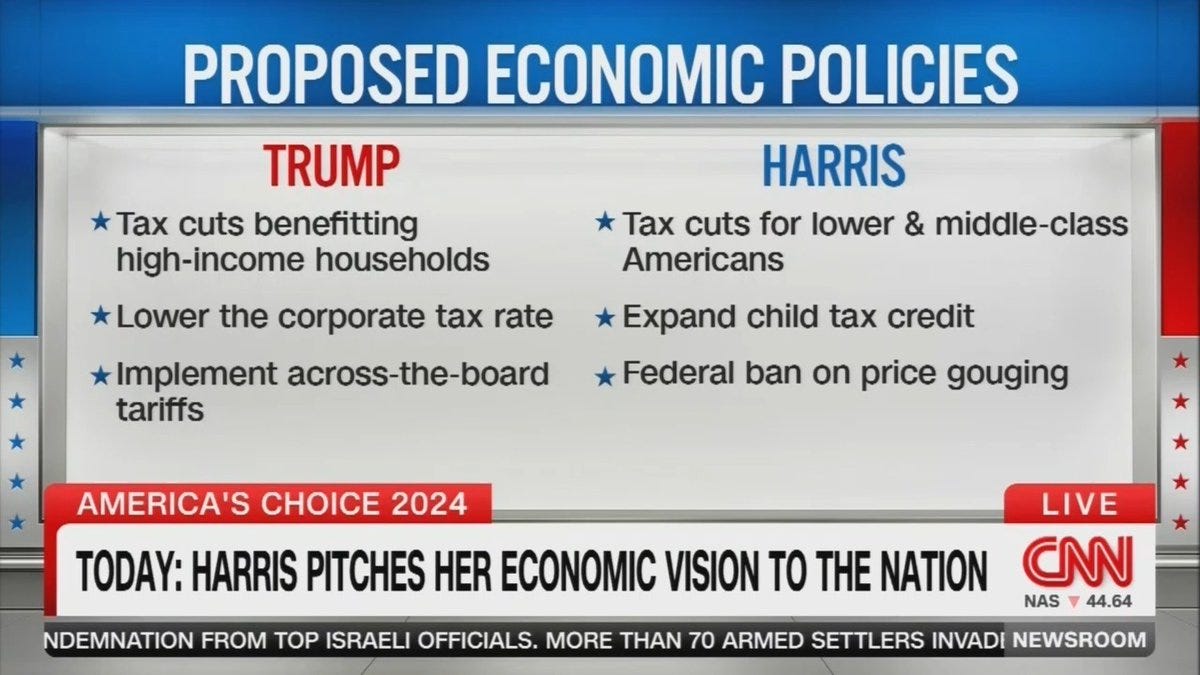Kamala Harris's New Way Forward on the Economy
The Vice President is taking the fight to Trump on the top issue in the election
Amidst the political tumult of the last couple of months, one thing has remained constant — the economy is the top issue for voters. More specifically, concerns about elevated prices — despite declining inflation — continue to drive the political conversation.
In the most recent New York Times/Siena poll of Michigan, Pennsylvania, and Wisconsin, 22% of likely voters said the economy was the single most important issue in deciding their vote — 8 points higher than abortion and 9 points higher than immigration. Dissatisfaction with the economy helped propel Trump to a lead earlier this year despite his convictions, indictments, and involvement with insurrections. This week, Trump gave a speech in North Carolina that was billed as a major economic speech, and on Thursday, he gave an interminably long press conference at his golf club regarding high prices.
Yesterday, also in North Carolina, Vice President Kamala Harris gave her first major policy speech of the campaign. She also focused on high prices. Head-to-head engagement on this issue tells us a lot of very good things about how Harris and her team are messaging on the economy. Others are more qualified than I to weigh in on the substantive merits of her proposals, but the politics are promising.
Watch the whole thing if you can, it’s great.
1. What She Proposed
Read the full policy paper on Harris’s proposals HERE, but the major tenets include:
Lowering grocery costs with the first-ever federal ban on price gouging on food and groceries;
Restoring the Child Tax Credit that provided $3,600 per child for middle and working class families;
Cutting taxes to help Americans afford health insurance on the Affordable Care Act marketplace;
Capping the cost of insulin at $35 and out-of-pocket expenses for prescription drugs at $2,000 for everyone;
Calling for the construction of three million new homes to end the housing shortage in four years; and
Providing $25,000 in down-payment support for first-time homeowners.
Even though these items represent a piece of her broader economic agenda, it is impressively comprehensive for a campaign created out of thin air less than a month ago.
2. Why Now?
The timing of yesterday’s rollout is aggressive and particularly savvy.
It is unusual for a presidential candidate to give a major policy speech right before the convention. Normally, they roll into the convention on a wave of momentum with big rallies. And not for nothing; the speechwriters are usually slammed working on the convention speech. But Harris is in a unique position. Most candidates arrive at the convention after campaigning for over a year. They have laid out their policy agenda in countless speeches, forums, and primary debates.
Due to the brief nature of her campaign, Harris was without this opportunity. She launched herself into the race with an imperative to pick her VP under a very compressed timeline. Harris is far from a blank slate. She’s been Vice President for nearly four years but hasn’t yet laid out her vision going forward.
There are two reasons to do it now. First, there is no time like the present. There are only so many days left in the campaign. Second, it’s important that the convention speech isn’t burdened with the expectations of major policy rollouts. That speech, which tens of millions of people will view, is her best opportunity to introduce herself to the nation. That speech should not sound like a mini-State of the Union, filled with a raft of policy proposals. Instead, she should communicate her story, values, and vision. Policy will be mentioned, but it isn’t a policy speech. There is no need to go into mind-numbing detail.
3. Harris’s Economic Message
Because his fake persona as a business tycoon was imprinted on the American psyche via tabloids and reality television, Trump has always had an advantage on the economy. That advantage was magnified this cycle because he associated himself with the economic stability and lower prices during the pre-pandemic era. The best thing the Trump economy achieved was not massively fumbling all of the work Barack Obama did to rebuild the economy after the Great Recession — but I digress.
In that NYT/Siena battleground poll, Trump has a 6-point advantage over Harris in terms of trust on handling the economy. This gap is much narrower than Biden faced, but still presents a challenge. This speech and the policies announced are a roadmap for how Harris plans to narrow that gap and win the election:
Framing the Core Contrast: The overarching message is simple and should be repeated at every opportunity:
Harris will put money back in your pocket and build up the middle class. Trump will cut taxes for billionaires and raise them for middle-class families.
Forging a New Way Forward: By dint of his incumbency and pride, President Biden’s economic message was primarily backward-looking and defensive. He tried to educate the public on his accomplishments and persuade them that the bad economy was a matter of perception. As embodied by the slogan “A New Way Forward,” Harris projects a future-oriented economic message. She, of course, mentioned the many accomplishments of the Biden-Harris Administration, but is using them as the foundation for her new policies. She can do X, because she and Biden did Y.
Taking on Powerful Special Interests: The policies tell a story about how Kamala Harris is and the kind of President she will be — someone who takes on powerful special interests on behalf of working families. Implementing these policies means picking fights with Big Pharma, powerful insurance companies, banks, and huge corporations. This is a consistent and important part of Harris’s biography — she took on the big banks on behalf of homeowners.
Taking on Price Gouging: Some economists spurned Harris’s proposal to ban corporate price gouging on food and groceries. Note that many of these folks are very credulous when it comes to corporate power. However, in terms of the politics, Harris is right on the money. In polling from Blueprint, a Democratic organization, 81% of all voters and 84% of Independents support penalties for corporate price gouging. Additionally, voters think Harris’s policies are an effective way to address prices. By a 42-point margin, voters believe that using antitrust legislation to enforce existing laws against price gouging will lower inflation.
Fighting for You: The biggest takeaway from this speech is that Harris is reframing the economic question from who will better manage the economy to who will fight for you. Harris must be seen as the better economic manager by Election Day. This is a tall order given the short timeline and Trump’s advantages. She must convince people she fights for them and Trump fights for rich and powerful folks. This is similar to the approach that Obama used in 2012. As Harris put it in her speech:
I think that if you want to know who someone cares about look who they fight for.”
Yesterday's roll out was a major test for Kamala Harris and her campaign and they passed it with flying colors. The next step is ours. People will only hear this message and learn about these policies if we tell them. That work starts now.





I have to say, the change in tone, focus, and energy between Biden and Harris is breathtaking. I am actually looking forward to the convention!
thanks Dan, very helpful...
of course the Washington Post Editorial Board rushed to condemn Harris's proposals, and others are demanding more detail, which is ridiculous given the timeline on which she had to produce anything at all.
but. more galling is, the GOP and its leader barely have a platform—after not having one at all in 2020—and Trump's idea of policy has never gone beyond Muslim bans and "we'll fix all of that very quickly," and nobody demands details from them. maybe it's an extension of the political press's pathetic "but everyone knows that's just Trump, and they'll never change, so why bother?"
iow, by behaving aberrantly (is that a word?) as a matter of course, GOPs have eliminated demands that they behave like an actual functional political party that cares about governance. they are empowered to pretend to be such but under no expectations that they will, while Democrats are held to standards that simply don't exist for Republicans.
I do think Dems' newfound snark could indicate we are FINALLY ready to stop being polite little fools as we and our country are attacked by these folks, and hope that's the case. some of the energy we're now riding on is from the enormous release of pent-up energy and frustration over exactly this: we need to see some fight, and we're finally getting it. and yes, it is glorious.